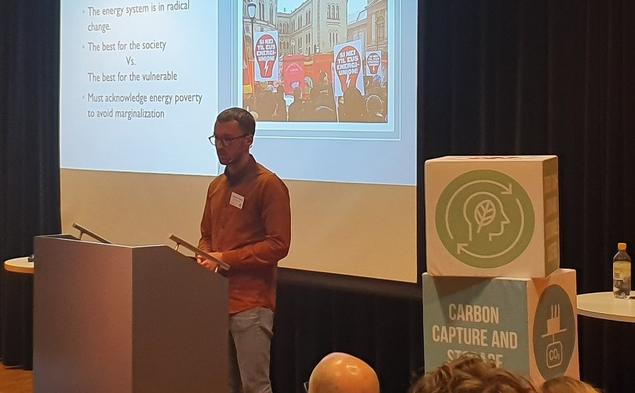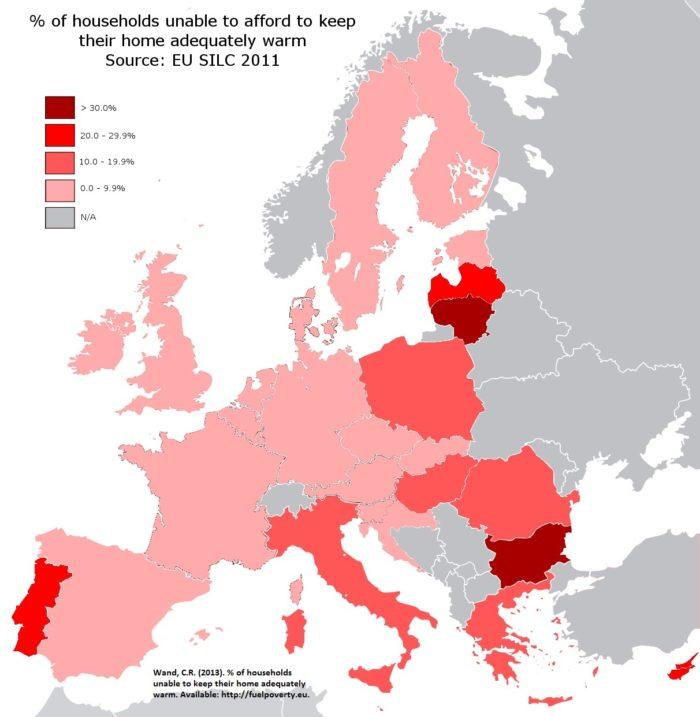Energy poverty: FNI student wins research ‘pitching competition’

Does energy poverty exist in Norway, where ‘no one’ is poor, and energy is abundant? Torjus Lunder Bredvold, master student affiliated with the Fridtjof Nansen Institute (FNI), digs into the phenomenon - and recently won a student pitching contest for his project.
 The pitching contest took place 27 November at the UiO:Energy Forum 2019, a conference hosted annually by the University of Oslo (UiO). Ten PhD and master students presented a variety of energy-related research projects, all aimed at providing knowledge and solutions that can help foster an energy transition that is sustainable for the climate, for the economy and for the society as a whole.
The pitching contest took place 27 November at the UiO:Energy Forum 2019, a conference hosted annually by the University of Oslo (UiO). Ten PhD and master students presented a variety of energy-related research projects, all aimed at providing knowledge and solutions that can help foster an energy transition that is sustainable for the climate, for the economy and for the society as a whole.
Understudied phenomenon
Bredvold, an UiO master student with a scholarship from FNI, presented his project on energy poverty in Norwegian households – a pitch which ultimately won him the whole contest.
It is a common conception that no one is poor and electricity is cheap in Norway, but I study a socio-economic phenomenon that contradicts both claims, said Bredvold.
He explains that energy poverty can be defined as people who spend more than 10 percent of their income on energy, who are behind on paying their electricity bills, or who experience freezing temperatures at home all winter.
More than 50 million people suffer from energy poverty in the EU, but in Norway, the phenomenon is strikingly understudied. Nonetheless, it is an important topic for those experiencing it. In fact, the informants Bredvold has interviewed so far for his master thesis, hardly go through a day without anxiously asking themselves how they will afford to pay their bills if they turn on the heat or switch on a second light.
Huge social impacts
‘I’ve talked to a middle-aged woman living alone who spends her evenings in bed in order to cut heating costs. People who burn books because they cannot afford firewood, and a pregnant woman who had casseroles of boiling water all over the living room because the ovens didn't heat sufficiently,’ said Bredvold.
Energy poverty might be a marginal issue in Norway, where living standards are generally high, but for those who are affected by it, it has huge impacts. Bredvold finds people feeling undignified, socially excluded and ashamed. He hopes his study can help increase awareness of the issue.
The energy system is in radical change with smart meters, Teslas and increased cooperation with the EU. But what is best for the society as a whole is not always what's best for the most vulnerable groups. If we do not acknowledge energy poverty in Norway, the sustainable energy transition risks marginalizing the already marginalized.’
Broad mix of issues
The student pitching competition provided highlights and samples from a variety of different research projects, covering issues such as peer-to-peer energy trading, risk management for power suppliers, and the improvement of future batteries. A diverse and competitive mix, in other words. Brevold is grateful his project was appreciated:
‘I am honored to win the contest and hope that it might give some recognition of energy poverty in Norway. We consume energy in virtually every daily activity, and we need to know more about how constrains related to energy consumption affect people’s lives, especially the most marginalized.'
Related reading:
Social justics in the energy transition - FNI part of new research centre
Energy poverty in Europe:

